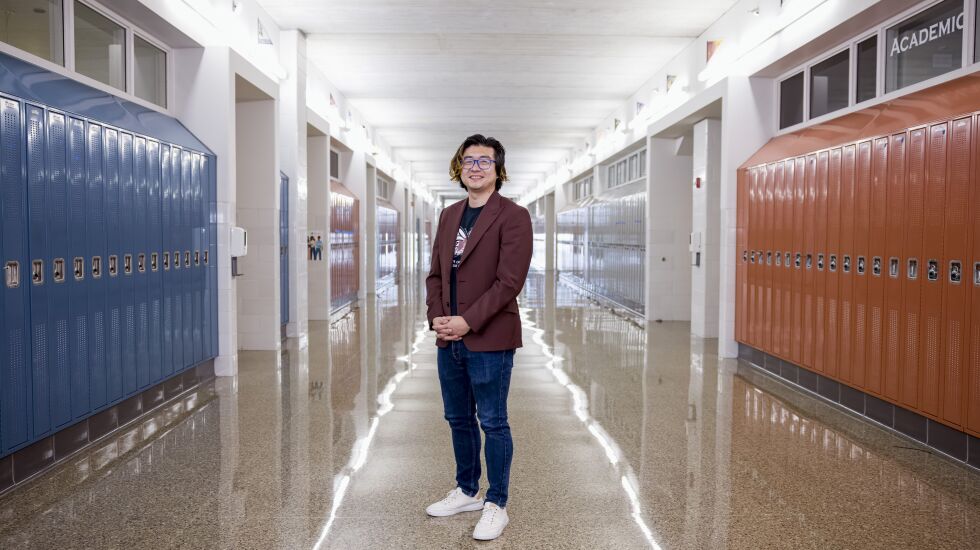
A usually engaged student in Jianan Shi’s 11th-grade science class had started struggling. The kid fell behind academically. He started sleeping in class. Like most teachers, Shi got on the student’s case.
“I ended up pulling him aside,” he said. It turned out “he’s working third shift.”
The teenager needed a job to support his family.
It was one of the many moments in his three years at Chicago’s Solorio Academy High School that inform Shi’s view of education — it takes more than a textbook for students to succeed.
“You have to understand why that kid is exhausted,” Shi said, “and therefore, how do we work around that?”
Shi knew the struggles himself as an undocumented child in suburban Boston and later as a community organizer in Chicago leading the parent advocacy group Raise Your Hand for Illinois Public Education.
He takes those experiences into a new role this year serving as Mayor Brandon Johnson’s Chicago Board of Education president.
It’s a meteoric rise from teacher to nonprofit leader to overseeing the nation’s fourth largest school system in less than a decade — and one that represents the growing influence of the the once-small Raise Your Hand, a close Chicago Teachers Union ally.
At 33, Shi is the youngest board president since mayors began appointing them in 1995. He’s not a parent. And yet he represents the progressive education movement’s chance at reforming Chicago Public Schools after years of fierce advocacy for under-resourced students and schools.
“I’m pretty good at not centering myself,” he said. “It’s about listening and collaborating. And that may not be sexy, but it’s what builds trust. It’s what builds relationships. And that’s how I lead.”
Experiencing early moves in life
Shi was born in Jinan, China, and raised there by his grandmother. At 5 years old, political and civil unrest in China prompted his father — who worked as a tour guide — to take Shi to Toronto, Canada, where one of his dad’s clients took him in.
“I was born in 1989, so think about Tiananmen — everything’s locked down,” Shi said.
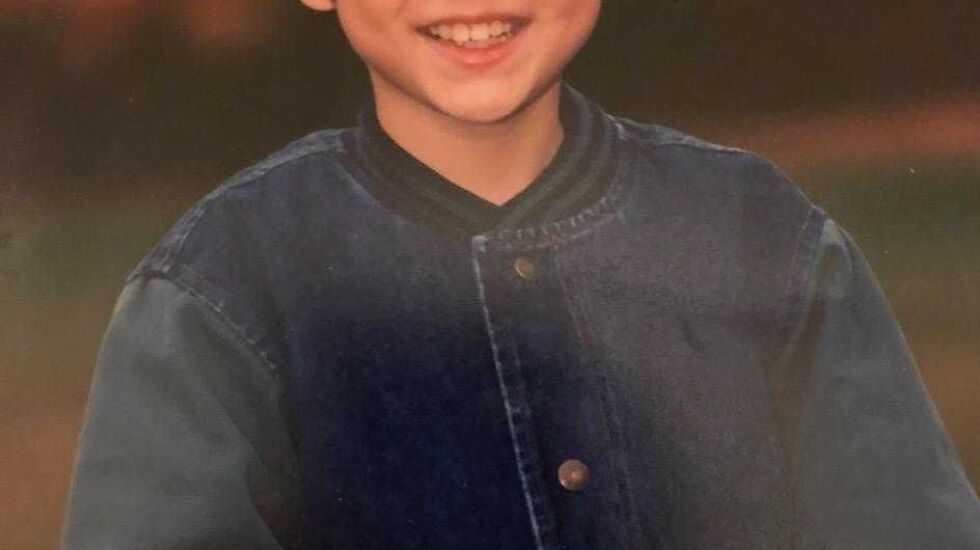
A couple years later, Shi’s aunt and uncle visited Toronto and took custody. They moved him across the border to suburban Boston and raised him as their own. He calls them his parents, and he calls his cousin his sister.
That move left Shi undocumented in the United States for nearly a decade, until he was almost 17. But it also gave him more opportunities.
“I think that there are three versions of me in this world,” Shi said. “One that stayed in China. One that stayed in Toronto. And one that’s here now.
“These three versions don’t deserve anything more or less. But their access to education, their access to opportunity, changed drastically.”
His aunt and uncle enrolled him in extra classes to learn English. He had access to more books. He could freely learn what he wanted.
“My whole life trajectory changed,” Shi said. “Nothing actually because of me.”
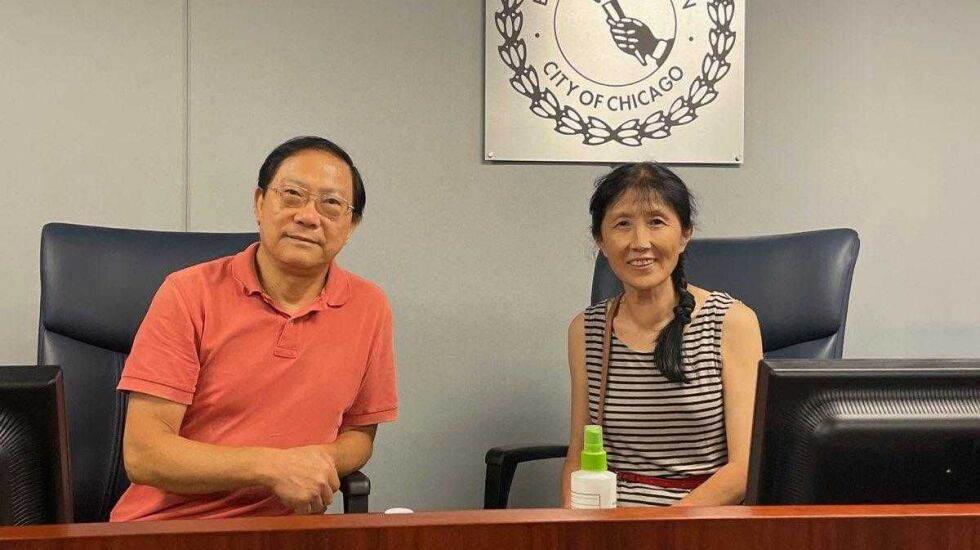
Shi went to Boston College to pursue medicine. But he found other interests, like an independent study on homelessness his sophomore year and an internship at an at-risk center for unhoused young adults.
“I was teaching GED classes to folks close to my age, and I saw again, because of their circumstances, that’s where they were,” he said. “That’s when I realized, ‘Hey, I think I’m called to something different than medicine.’”
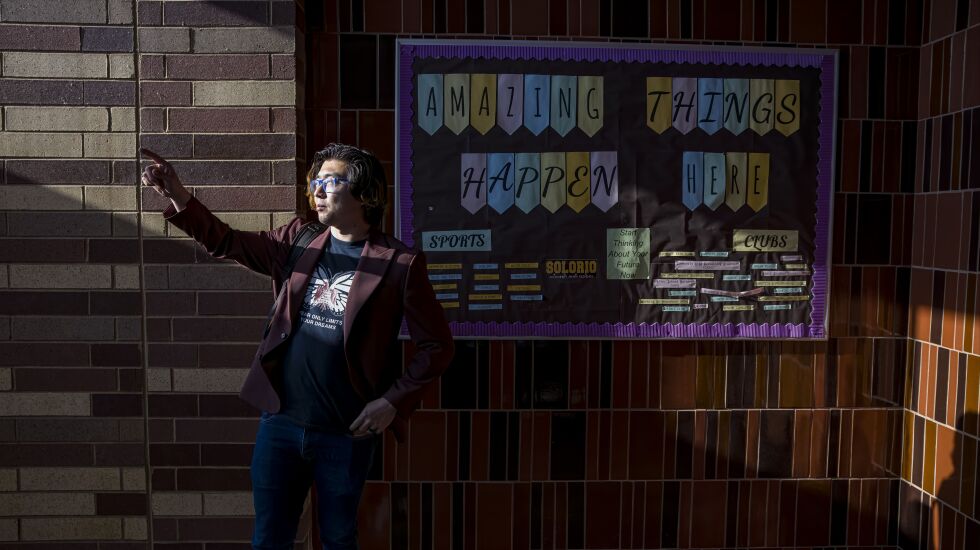
Different career path
Shi dropped his honors thesis in neuroscience and got a teaching degree. He used his short medical background to teach ninth-grade science in Boston, where he says he “just wanted to focus on being the best damn educator possible.”
A self-described “curriculum nut,” Shi would speak at education conferences about reading and literacy. He also joined the equity committee at school and discussed race in people’s experiences.
When he moved to Chicago, he’d spend hours at a time writing curriculum, much of it with fellow 11th-grade Solorio science teacher Deanna Digitale-Grider. She said Shi’s skill as a teacher went beyond books.
“Jianan is the most emotionally intelligent colleague I’ve ever worked with,” she said. “A really thoughtful and insightful leader in terms of what a group needs in order to move forward.”

Victor Iturralde, Solorio’s founding principal since it opened in 2010, said Shi was an energetic science teacher.
“He kept students engaged that way, off balance, like totally just by his presence, his energy, just everything he brought,” Iturralde said. “But he also developed those relationships where, if a kid wasn’t keeping up with the expectations, he would make sure he takes time to conference with them and follow up with them and ask about that.”
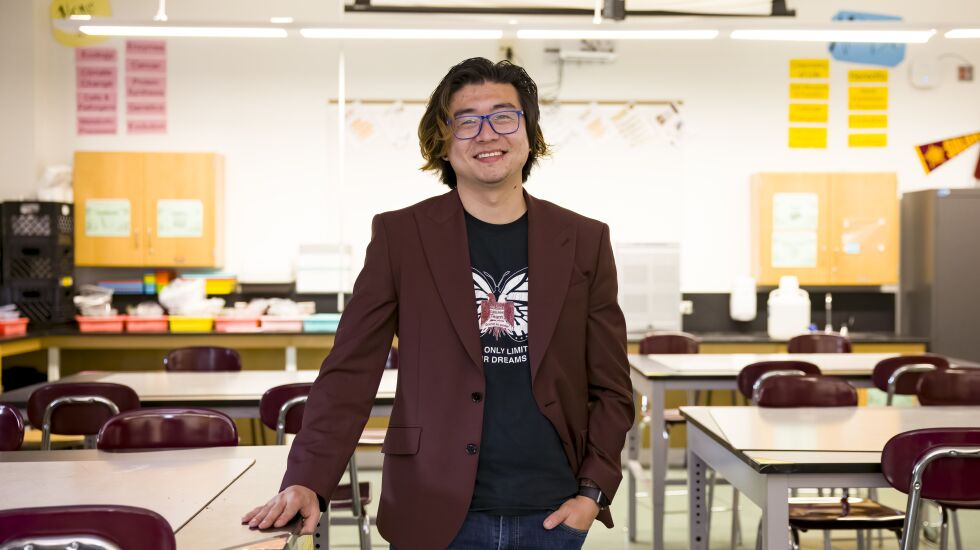
Exposure to activism in Chicago
During a teacher institute day at Solorio Academy High School on Chicago’s Southwest Side, Shi, a new teacher there, listened to a fellow educator give a presentation.
Rigo Padilla was teaching the staff about undocumented students’ challenges and needs and how to help them. Padilla himself was undocumented — he became a national leader for the DREAM Act when his fight against deportation drew national headlines over a decade ago.
“I remember being like, “Holy shit, who is this guy?’” Shi recalls today, speaking in his old Room 223 at Solorio.
“I’d never seen someone undocumented talk about undocumented students with such power,” he said. “I spent a lot of my life in the shadows — told no one my status. … I was very scared as a kid.”
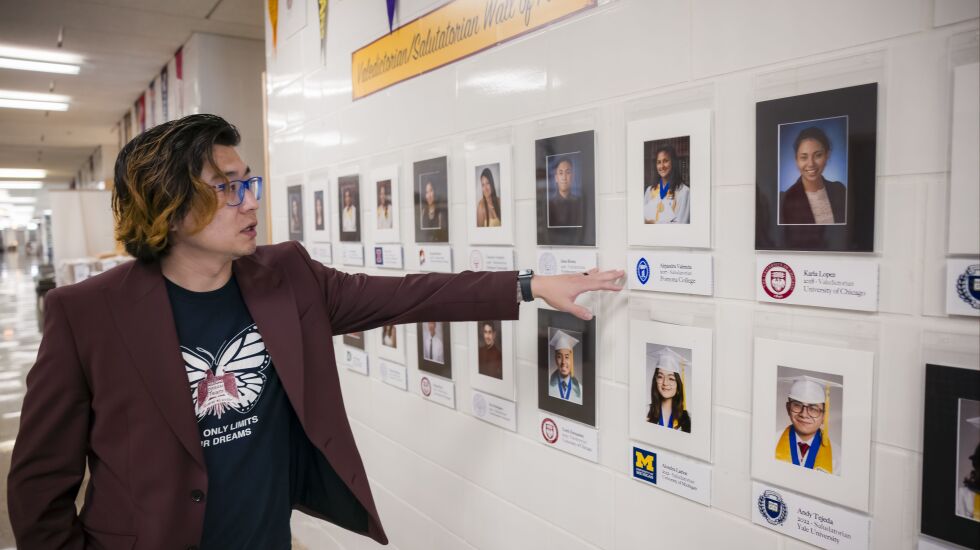
Like in Boston, Shi had moments that taught him about students’ needs outside the classroom and what he could do to help.
He had a few students who typically got great grades, and “I was, like, ‘Where are these Ds coming from?”
It turned out they were newly experiencing homelessness.
“When I got to Chicago, the organizing environment really helped activate me outside the classroom more,” Shi said.
He grew close with Padilla — they co-led the school’s DREAM Team, a club that brought together and supported undocumented students and raised money for scholarships. Shi credits Padilla with teaching him Chicago’s activism history, notable past and present organizers and how structures worked in the city.
Padilla died of brain cancer at age 35 last month. He was still on staff at Solorio.
“I owe him,” Shi said. “I’m not here without him.”
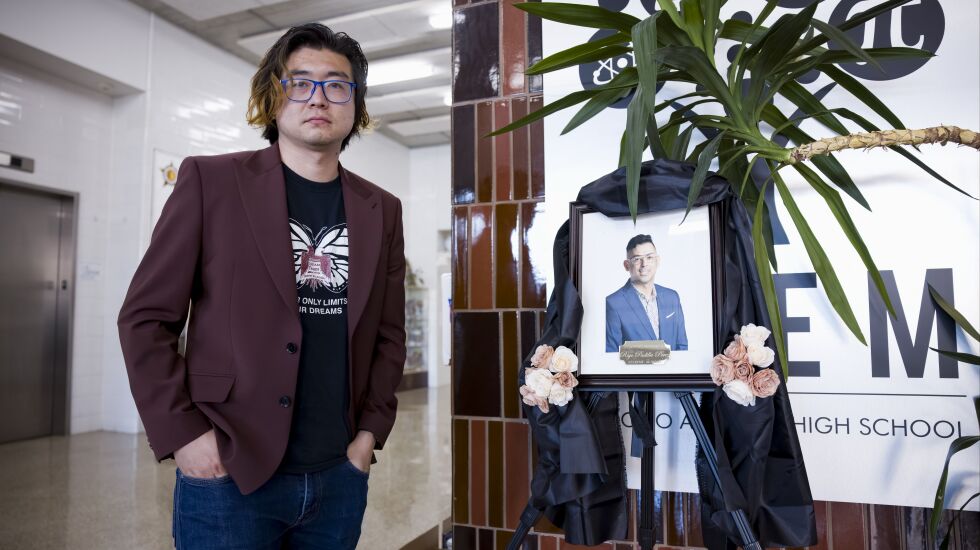
‘Do you have the passion?’
Shi said he hadn’t thought much about leaving Solorio.
When he walked through the front doors into the school’s broad lobby for work every day, he saw what a high school should be all about. The boys soccer team donned their uniforms and walked out fist-bumping the security guard. A folkloric dance team practiced behind a curtain to the left. Posters, murals and awards decorated nearly every inch of every wall.
The school was his entrance into Chicago, and it felt like home, he said.
But his exposure to activism — like the parents and teachers protesting the proposed National Teachers Academy closure — pushed him into leaving teaching for organizing. He took a job in 2019 as the executive director of Raise Your Hand, which was founded in 2010.
His time with the organization featured activism around empowering Local School Councils, fighting for COVID-19 safety precautions in schools, lobbying for an elected school board and pushing for more equitable school funding.
Miguel del Valle, Shi’s predecessor as former Mayor Lori Lightfoot’s pick for board president, said Raise Your Hand was a vocal and noticeable group under Shi’s guidance.
But a move from there to Board of Education president — which also comes with a board seat for the Public Building Commission that plans, designs and constructs municipal buildings — is a nearly unprecedented jump.
Del Valle had quite a different experience level than Shi. He was a state senator for two decades — the first Latino elected there — with a long history of education advocacy in Springfield. He finished third in the 2011 Chicago mayoral election.
Del Valle said he sees Shi as a thoughtful leader who listens to advice and has a feel for the school system’s most pressing issues.
“While he doesn’t have the long track record that I had in education, he has enough of a track record and is familiar enough with the work of CPS to be in that position,” del Valle said.
“He’s a young man, but I think he’s had enough experience. But to me, it’s not just life experiences. It’s also, do you have the heart? Do you have the passion, the commitment? And I think it’s there.”
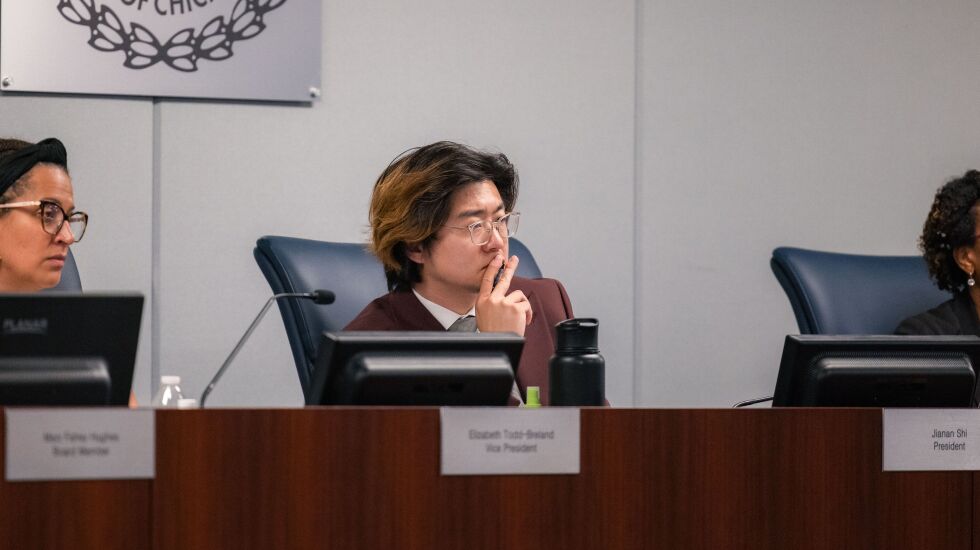
Unlike others who took the volunteer board president role, Shi, for now, has opted against finding new paid work until he gets his feet under him. He resigned from Raise Your Hand when the mayor appointed him to the board.
He also recognizes some may view him as too inexperienced for the role. But he said he doesn’t have time to think about much other than the district’s pressing needs and his top priorities.
A $628 million financial cliff is approaching in less than two years. School buildings are old and falling apart. And special education at CPS is still faltering. His term ends in 16 months when a new 21-member partially elected school board takes over.
Like the new mayor, Shi is an activist now in a position to make decisions.
“I have a responsibility,” Shi said, “to shape the district I’ve been talking about the past decade.”







